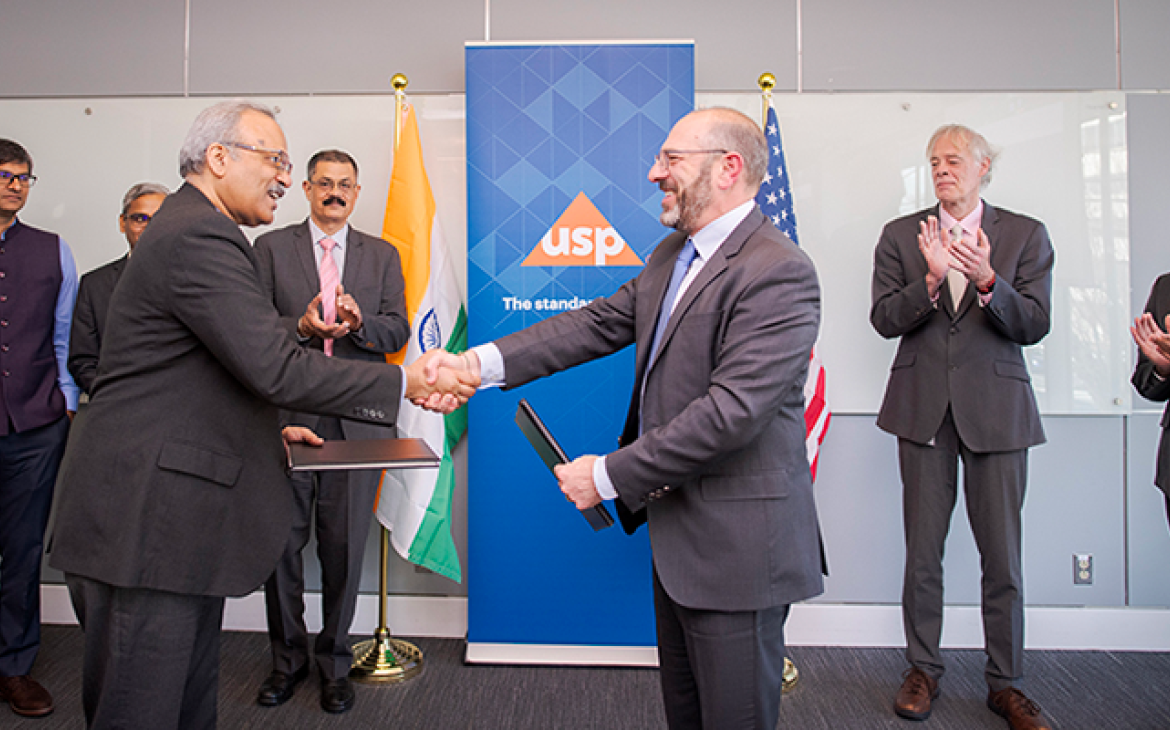
In this conversation, US Pharmacopeia (USP) Director of Regulatory and Public Policy Development Amy B. Cadwallader, Ph.D. joins the Duke-Margolis Drug Supply Chain Resilience and Advanced Manufacturing Consortium to discuss the importance of multi-disciplinary, cross-functional coordination to strengthen the medicine supply chain and global public health resilience in the face of ongoing threats, like persistent drug shortages. This interview is a re-print with permission from the Duke-Margolis Center for Health Policy and was first published as a feature for the Consortium's eNewsletter. USP is a Consortium member and is represented on the Advisory Group by Amy B. Cadwallader.
Duke-Margolis Drug Supply Chain Resilience and Advanced Manufacturing Consortium (DM): How do you see the Consortium addressing ongoing drug shortage and drug supply chain issues?
Amy Cadwallader (ABC): Drug shortages have reached an all-time high since 2014, and USP, along with several others, has been calling for more efforts to coordinate pharmaceutical supply chain resilience and reliability activities among federal agencies and non-governmental stakeholders.
The Consortium is a great example of multi-disciplinary experts working cross-functionally to advance actionable solutions to address current and future supply challenges.
DM: What insights have you gained from engaging with different stakeholders through Consortium membership?
ABC: The Consortium is comprised of experts from several different links of the medicines supply chain making the conversations robust and dynamic – issues are discussed from many perspectives and vantage points. The insights from these conversations are invaluable because they provide visibility into and insights about many areas of the supply chain that other members do not regularly engage with. The diversity of thought and experience is remarkable, and I leave every meeting with new learnings and valuable information to take back to my colleagues at USP.
DM: What solutions and resources does USP offer to support drug supply chains?
ABC: USP offers numerous resources to support both the public and private sector. I’d like to highlight two solutions in particular, including our Medicine Supply Map and Continuous Manufacturing Knowledge Center.
- USP Medicine Supply Map uses AI/Machine Learning to analyze 250M+ datapoints and insights from 40+ external data sets (including FDA and non-US regulatory agencies), as well as USP's proprietary data on usage of our quality standards in more than 22,000 locations around the world. The ongoing Medicine Supply Map analyses of potential medicine supply chain disruptions can offer governments, regulatory agencies, manufacturers, and others such as hospitals, the opportunity to prioritize supply chain resilience investments and identify and respond to risks sooner. This type of proactive and informed approach can aid both in the prevention of drug shortages and mitigation of the impact of those that do occur.
- USP Continuous Manufacturing Knowledge Center (CMKC) is an online, open access collaborative forum established by USP and the National Institute for Pharmaceutical Technology and Education (NIPTE) that provides a space for discussion, information sharing to help advance the adoption of continuous manufacturing. Advanced manufacturing technologies, like continuous manufacturing, have the potential to improve manufacturing efficiency, reduce production costs, reduce environmental footprints, and support supply chain resilience and reliability. USP and NIPTE created the CMKC to help offset the limitations shared by manufacturers regarding various practical, operational, and regulatory challenges to adopting advanced manufacturing technologies.
DM: What are some of USP’s recent efforts to strengthen drug supply chains and address shortages?
ABC: On September 26th, USP co-hosted a Summit with American Cancer Society, American Cancer Society Cancer Action Network on Cancer Drug Shortages. The event engaged various experts representing Duke-Margolis, FDA, the American Society of Clinical Oncology, and many others who discussed data behind cancer drug shortages and needed next steps.
USP recently shared a Policy Position Paper on Drug Shortages with five recommendations to address supply chain vulnerability and reduce drug shortages, including:
- Building early warning capabilities
- Establishing a vulnerable medicines list
- Coordinating supply chain resilience and reliability efforts
- Strengthening the manufacturing base for drug products
- Promoting sustainable prices for generic medicines
This past summer, USP also hosted a workshop on Identifying and Addressing Barriers to Continuous Manufacturing Adoption.
Through its standards, scientific expertise, capability building solutions, unique insights, and work with organizations like Duke-Margolis, USP is working to enable a more resilient medicine supply chain so that people can get their medicines when they need them. For more information about USP’s most recent efforts and solutions, visit our website and follow @USPharmacopiea on LinkedIn and X, formally known as Twitter.
About The Consortium: The Duke-Margolis Drug Supply Chain and Advanced Manufacturing Consortium works to identify effective policy solutions that promote a resilient drug supply chain with advanced manufacturing capabilities and, ultimately, reduce the frequency and severity of drug shortages. The Consortium operates on a membership model, convening a wide range of experts in supply chain, manufacturing, regulatory science, national security, and drug shortages from academia, private industry, governmental agencies, and additional relevant stakeholder groups.
About Amy: Amy B. Cadwallader, Ph.D. leads development of USP regulatory and public policy positions and is responsible for the creation of evidence-based policy content to help advance the supply of quality medicines and biomedical innovations. She also leads the USP Quality Institute, an independent, globally focused research department, focused on cultivating open discussion, public policy, and regulatory reforms that advances the global quality medicines supply. Cadwallader received her doctorate in pharmacology and analytical toxicology from the University of Utah, her M.S. in biology/forensic science from Virginia Commonwealth University, and B.S. in chemistry and biochemistry and molecular biology from Dickinson College.


